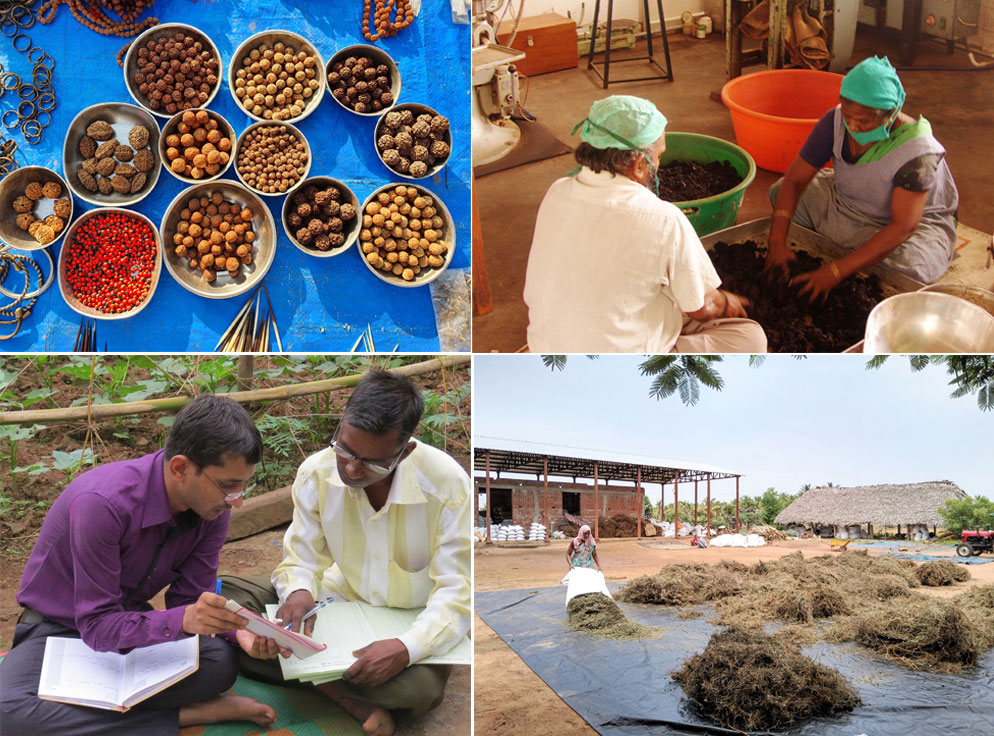Access and Benefit Sharing (ABS) Partnership Project-Conservation and Sustainable Use of Biodiversity

OBJECTIVE
The ABS Partnership project aims at strengthening the capacities of the National Biodiversity Authority (NBA), selected State Biodiversity Boards (SBB) and Biodiversity Management Committees (BMC). It also aims at creating awareness amongst commercial users of biological resources and associated traditional knowledge for the effective implementation of ABS mechanisms under the Biological Diversity Act 2002, in keeping with India’s commitments under the Nagoya Protocol on ABS.
SITUATION
India is one of the 17 megadiverse countries in the world. With just 2.4 per cent of the world’s land area, India’s biological richness is spread across a vast range of habitats and ecosystems. These support 7 per cent of globally recorded species, including over 45,000 plants and 91,000 animal species—out of which many are keystone and charismatic species. India’s rich biological heritage coexists with over 1.2 billion people and about one-sixth of the world’s livestock population. For millions of Indians, therefore, biodiversity supports their very livelihoods and way of life. Thus, protecting and maintaining India’s rich biodiversity and natural resources is essential for achieving inclusive and sustainable development. India gained prominence as one of the leading countries which signed the United Nation’s Convention on Biological Diversity (CBD) in 1992 and further adopted the Nagoya Protocol in 2014. This led to an early set-up of a legal framework to ensure fair and equitable sharing of benefits arising from utilisation of biological resources.
The Indian Parliament enacted the Biological Diversity Act (BDA) in 2002 which is being implemented nationwide by the National Biodiversity Authority (NBA) as well as through decentralised institutional structures like the State Biodiversity Boards (SBB) and the Biodiversity Management Committees (BMC) at local level. The NBA notified the ‘Guidelines on Access to Biological Resources and Associated Traditional Knowledge and Benefits Sharing Regulations’ in 2014 which prescribe the procedures for access to biological resources and guides the fair and equitable sharing of benefits arising from the use of biological resources with providers of the resources. However, the potential of the legal framework on ABS to secure benefits from the use of biological resources has not fully been explored. This limits the range of economic and social benefits that are channelled back to the communities. Tapping the provisions of the Biological Diversity Act, with ABS supporting its implementation, can significantly contribute to conserving and promoting sustainable utilisation of biological resources. This holds an enormous potential for economic development of local communities.
APPROACH
The project is implemented at the national level in partnership with the NBA, at the state level, with the three State Biodiversity Boards (SBB) of Maharashtra, Uttarakhand and Tamil Nadu, and at local level with Biodiversity Management Committees (BMCs) in all three states.
The project employs the following approaches:
- Awareness-raising, communication, and stakeholder dialogues across different actors and stakeholder groups on creating a better understanding about the Biological Diversity Act 2002, ABS Guidelines and the Nagoya Protocol on ABS
- Development of good practices on benefit-sharing among communities, based on utilisation of biological resources for commercial as well as research purposes
- Development of an IT-enabled ABS monitoring system for the National Biodiversity Authority to effectively monitor the use of biological resources in ABS processes
PUBLICATIONS
- BMC Training Package Implementation Guide
- Design Guide ToT BMC ABS Project
- Communication Strategy for ABS India
- BMC Training package Methods
- Guide BMC Consultation
- Good Practices of Access and Benefit Sharing
- ABS standee
- ABS Factsheet
- ABS Communication Strategy
- ABS Monitoring Tool Brochure
- ABS brochure revised 2018
- ABS poster, Chronology and Initiatives in India
- ABS Standee
- Agriculture – Access and Benefit Sharing Key Points for Policy-Makers
- Industrial Biotechnology – Access and Benefit Sharing Key Points for Policy-Makers
- The Food and Beverage Industry – Access and Benefit Sharing Key Points for Policy-Makers
- The Cosmetics Industry – Access and Benefit Sharing Key Points for Policy-Makers
- The Pharmaceutuical Industry – Access and Benefi t Sharing Key Points for Policy-Makers
- Policy Paper- How ABS and the Nagoya Protocol contribute to the Sustainable Development Agenda
- Strategic Communication for ABS – A Conceptual Guide and Toolkit for Practitioners
- National Study on ABS Implementation in India
- Access and Benefit Sharing (ABS) Partnership Project
COUNTRY
India
DURATION
Nov 2016 - Apr 2020
Commission Agency
BMZ
SDG



